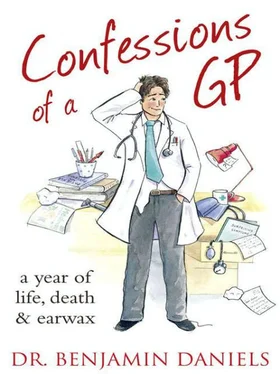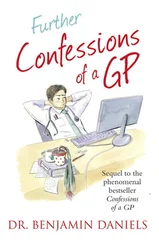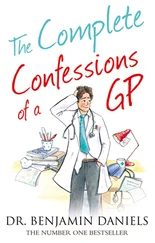I was on holiday in Namibia. I was sitting around a fire in one of the most remote deserts on earth, yet simply by using my mobile phone, I could instantly view photos of my cousin’s new boyfriend in Australia and read a full and detailed report on how my Sunday league football team had lost again in my absence. Once back home in NHS land if my patient goes to see a consultant at the hospital two miles down the road, I have to wait several weeks for his letter to be typed, posted, arrive at my surgery and then be filed by my secretary. It seems crazy to me that we are so backwards when it comes to something as essential as sharing important information about patients.
In general practice our failure to have embraced technology is usually nothing more than an annoyance, but in hospitals it can be more than that. Currently, if an unconscious patient is admitted to A&E in the middle of the night, the doctors will often have very limited medical information about them. The patient might have some paper notes in a file sitting in a secretary’s office somewhere, but unfortunately, there is no way that the A&E doctor can access the GP’s computer records, which might have lots of very useful information that could potentially help save the patient’s life.
If A&E had access to the medical records, we might have information that s/he was a diabetic or a heroin addict or even that s/he had advanced cancer and didn’t want to be resuscitated. As you can imagine at 3 a.m. on a Sunday, this information could be very useful and greatly increase the speed with which we could make a diagnosis. The records might also give us a relative’s telephone number and a list of the person’s normal medication.
There are obviously big benefits of having all our medical records on a computer system to which all healthcare professionals can have access. The area that many people are concerned about is maintaining confidentiality. There are so many people working for the NHS and in social care that sensitive personal information about us all could be available to a huge number of people. For example, if my sister up in Newcastle started seeing a new bloke, might it be tempting for me to look up his healthcare records? Unethical as it would be, I could find out if he had ever had genital warts or been arrested for hitting his ex-wife. These are the sorts of personal details that are often on our medical records and access is currently only available to the staff at your current practice.
Presently, the government is investing billions into a new integrated computer system for the NHS. The plan is that we will be able to store patients’ records centrally and also send referral letters and book appointments online. We are nowhere near having the system fully in place yet, but there have already been the usual grumbles of discontent. This has partly been because of criticisms about the quality of the technology and also opposition from patients and doctors. Personally, I do think that we do need to update the way in which we work. The technology would be a huge time-saver and, in some cases, a life-saver. Somehow we need to maintain patients’ trust and perhaps do this by allowing them to keep certain parts of their records excluded from the national database. The worst possible outcome of a national computer system would be that patients no longer felt safe disclosing personal information to their doctors.
Perhaps the most influential thing that happened to me at medical school was the death of a close friend. Kieran and I did our A levels together and as I went off to medical school, he had gone off to Leeds to start a psychology degree. Towards the end of my first year, I got a phone call from Kieran saying that he was in the hospital attached to my medical school. He had discovered a lump in his armpit some time ago, but full of the excitement of his first year at university, it had taken him a while to get round to seeing his GP. He was quickly diagnosed with a type of cancer called non-Hodgkin’s lymphoma.
Over the next two and a half years, Kieran proceeded to have several courses of radiotherapy and chemotherapy for his cancer. He had periods of remission but, unfortunately, they were always followed by a relapse. Our worlds had always been very similar, but now they seemed far apart. I would sit in lectures learning about the side effects of chemotherapy and just a few floors above me Kieran was lying in a hospital bed losing his hair and vomiting his guts up. I used to pop in to see him between lectures and even wheeled him, drip in tow, into our student union bar to watch a few of the big England games during the 1998 World Cup.
Kieran came from a big Irish family. During my teenage years, I had spent a lot of time at his house and I knew his parents well. There was no one medical in his family and during Kieran’s treatment his parents clung to me as a source of medical knowledge and as someone to translate the jargon into real English. I didn’t really want this role. I was only a couple of years into medical school and hadn’t even heard of non-Hodgkin’s lymphoma when Kieran told me he had it. I wanted to be there simply as Kieran’s friend and wasn’t ready to play the role of doctor during this awful illness.
As I progressed through medical school, Kieran’s cancer spread and worsened. I learnt more medicine and did begin to gain a limited understanding about some of the medical components of his illness and treatment. Eventually, the cancer spread to his brain and although Kieran and the rest of the family seemed to view this as only a minor setback, my basic medical knowledge was sufficient to know that the prognosis was now very poor. Just after Christmas 1999, Kieran declared that he had been given the all clear. He hired out a bar and threw a big party to celebrate. Kieran still looked terrible but told everyone it was simply the aftereffects of his chemotherapy. Deep down I knew that something wasn’t right but I so wanted him to be cured that I let myself believe that he was. While his friends got drunk and partied, Kieran sneaked off home and took a massive overdose. He had been told earlier that week that his cancer was now untreatable but he clearly didn’t feel able to tell us this. He wanted to have a big party and then go out with a bang. I guess he needed to take back some control over his life that had been ruled by the cancer for so long.
Kieran’s overdose was unsuccessful and he had two more precious weeks before he died peacefully at home. He had the opportunity to say goodbye to family and friends, plan his funeral and decide where he wanted his ashes to be scattered. We were all grateful for those last weeks and I hope Kieran was, too. At his funeral I remember his mum hugging me and, as we both wept she said to me, ‘This will make you a better doctor.’ An amazing thing to be said by a woman who had just lost her 22-year-old son. I just hope she was right.
‘’Allo, Doc. We’ve got a right one for you’ere. Mad as a box of frogs. We found ’im running down the middle of the dual carriageway completely starkers and shouting in gobbledygook.’
It was 3 a.m. on a cold February night and I was on call for psychiatry. The police had picked up my latest patient and, after diagnosing him with being ‘as mad as a box of frogs’, a common police diagnosis, they kindly dropped him off at the psychiatric ward for me to assess. The man, who we later found out was called Peter, was in his early twenties and looked fairly frightened. He was shouting in an unfamiliar language and was miming being attacked and chased. He gave the policemen each a hug (very much unappreciated) and they left him in my less than capable hands. Peter was wrapped in a blanket kindly donated by the local constabulary and given how cold it was outside, I wondered quite how he had survived any length of time being completely nude out on the dual carriageway in the middle of nowhere.
Читать дальше
Конец ознакомительного отрывка
Купить книгу











![Benjamin Franklin - Memoirs of Benjamin Franklin; Written by Himself. [Vol. 2 of 2]](/books/747975/benjamin-franklin-memoirs-of-benjamin-franklin-wr-thumb.webp)
![Benjamin Franklin - Memoirs of Benjamin Franklin; Written by Himself. [Vol. 1 of 2]](/books/748053/benjamin-franklin-memoirs-of-benjamin-franklin-wr-thumb.webp)